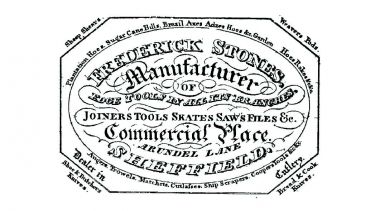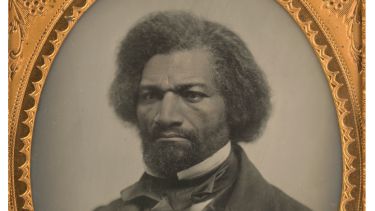- A research project from the University of Sheffield’s Department of History will explore the complex history of slavery in the region
- The project brings together research on Sheffield’s industrial past and the ways in which inland manufacturing areas were connected to the Atlantic economy from the 17th to the 19th centuries, alongside well known efforts to support the end of the slave-trade and slavery
- The authors hope the study will provide a valuable educational resource and will be the catalyst for further research into the local history of slavery as well as the often unrecorded stories and histories of Sheffield’s African and African-descended communities
A new study of Sheffield’s industrial heritage has been published by the University of Sheffield’s Department of History. The study, ‘Sheffield, Slavery, and its Legacies’ records the city’s complex relationship with the Atlantic economy throughout the seventeenth to nineteenth centuries.
The study - part of a major research project by the Slavery Research Hub within the Department of History - looks at the social and economic ways in which Sheffield was connected to the trade and enslavement of African peoples in the Americas.
Well-known for its anti-slavery abolitionists, the city played an important role in the political campaigns to help abolish slavery. However, lesser known are the ways Sheffield was materially connected to the Atlantic economy throughout this time.
Dr Michael Bennett, Dr Rosie Knight and Dr Andrew Heath from the Department of History worked with local archives, heritage organisations, and community groups such as the Sheffield and District African-Caribbean Community Association (SADACCA), to bring together records of the relationship between Sheffield manufacturing, Atlantic trade and slavery during the eighteenth and nineteenth centuries. The authors of the project report, Bennett and Knight, hope the work will become a key educational tool and a resource that allows people to explore a broader history of the city for the first time.
The study also highlights the the careers of the traders and ‘owners’ of enslaved Africans who were either born or lived in Sheffield; how wealth generated through slavery influenced the built environment of the regional area; and aspects of the history of African and African-descended peoples in the Sheffield region between the seventeenth and nineteenth centuries.
The study is important for understanding how inland manufacturing areas of the UK could be simultaneously connected to the Atlantic economy, yet also operated as centres of radical anti-slavery politics.
Lecturer in American History, Dr Rosie Knight, said: “Unlike major port towns and cities across the UK, Sheffield is not particularly known for its connections to the transatlantic slave-trade or slavery in the Atlantic world. We know far more about local involvement in the anti-slavery campaigns, for instance, through the the work of the Sheffield Ladies Anti-Slavery Society founded in the city in 1825.
“Our study examines the nuanced history of Sheffield, and demonstrates how Britain’s relationship with the mass enslavement of Africans went far beyond the direct involvement of the country’s ports.”
Research shows tools from Sheffield manufacturers being sent to plantations where enslaved people worked the land in the USA, Caribbean and Brazil and continued long after the abolition of slavery within the British Empire. Traders of enslaved Africans and plantation owners were also born, or resided in the local region at some point during their lives, and this small minority had an impact on the region in the stately homes, estates and railways that pepper the landscape.
Dr Michael Bennett adds: “The report also highlights examples of African and African-descended residents in the wider region dating as far back as the seventeenth century, as well as the visits of Black abolitionists to the city who worked to rouse local and national action against slavery.
“We hope the study will become a key educational resource used by academics, schools and the people of Sheffield to explore a more nuanced history of Sheffield’s relationship with Atlantic slavery. We are keen to explore new ways we can interpret our collective history, and to highlight how much more there is to be learned about local connections to slavery”
Rob J Cotterell, the Chair of SADACCA, said: “This report has finally given Sheffield the opportunity it so desperately needs to begin to understand the foundations upon which this city was built then and functions now.
“It is so important for us to begin to understand this intrinsic element of Sheffield's history, landscape, architectural built environment and economy. Further it is important in enabling us to understand how that inhuman trade and the steel manufacturing set a hostile environment then and is also intrinsically linked to the actual, structural and institutional racism today.
“This incredible body of research and making the archival information readily accessible as a result, allows people to conduct their own research around Sheffield and slavery, including myself.”
The academics hope the first study of the project will highlight how the region's connections to the Atlantic economy is just one aspect of the history of Sheffield and will be a starting point to tell the full stories of the African and African-descended people of the city.
Dr Andrew Heath, a senior lecturer in American History working on the project, said: “We need to look again at the history of Sheffield, and not only celebrate its anti-slavery history, but establish a richer picture of African-Caribbean histories. This can be a difficult process for researchers as accounts of disenfranchised people were often not recorded in ways that are apparent to academia.
“Sheffield’s diverse cultural history is reflected in today's festivals, events, art, music and oral history. We hope our research and work with community groups, creative industries, academics, artists and local heritage organisations, archives, and museums can play a part in uncovering, publicising, and reimagining Sheffield’s history for everyone.”
Sheffield and District African-Caribbean Community Association (SADACCA)
SADACCA is the home and hub for the African Caribbean diaspora, 'The home of the Bantu'. We exist to serve the needs of the Windrush generation and their extended families. * Bantu simply means people.




